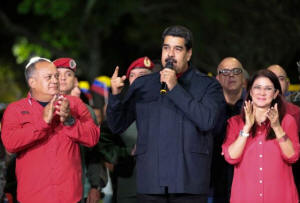|
Venezuela vote dispute risks rekindling
unrest, sanctions
 Send a link to a friend
Send a link to a friend
 [October 16, 2017]
By Alexandra Ulmer and Eyanir Chinea [October 16, 2017]
By Alexandra Ulmer and Eyanir Chinea
CARACAS (Reuters) - Venezuela's opposition
refused on Monday to recognize a surprise win for the ruling socialists
in a weekend regional election, potentially rekindling protests and
fresh foreign sanctions on the oil-rich country's moribund economy.
Venezuela's pro-government electoral board said President Nicolas
Maduro's candidates took 17 governorships, versus six for the
opposition, in Sunday's poll with turnout of more than 61 percent.
The socialists' strong showing was unexpected after devastating food
shortages and salary-destroying inflation fueled anger at Maduro. Polls
had suggested the opposition would easily win a majority, with one
survey giving them 44.7 percent of voter intentions against 21.1 percent
for the government.
Dismayed opposition leaders decried irregularities, called for street
action on Monday and demanded a full audit, but did not immediately
offer any evidence of fraud.

"Neither Venezuelans nor the world will swallow this fiction," said
grave-faced opposition election campaign chief Gerardo Blyde.
Dispirited about their chances of removing Maduro through protests or
the ballot box, many Venezuelan opposition supporters now hope foreign
sanctions will hurt him.
The Trump administration has already imposed sanctions on Venezuelan
officials including Maduro and curbed the country's ability to issue new
debt, which has spooked banks and complicated operations at state oil
company PDVSA.
The European Union could also take measures against Maduro, a former bus
driver and foreign minister narrowly elected to replace the late leader
Hugo Chavez in 2013.
At home, however, it remains to be seen whether opposition supporters
are willing to take to the streets again after four months of grueling
protests this year failed to pressure the government into holding an
early presidential election, freeing jailed activists or accepting
humanitarian aid.
At least 125 people died, while thousands were injured and arrested, in
violence that brought parts of Venezuela to a standstill as hooded
youths battled security forces.
Sunday's disputed result will further crush their hopes that the
unpopular Maduro can be removed in next year's presidential election,
possibly worsening disputes over strategy in the perennially divided
coalition.
"We've lost the country. Rest in peace, Venezuela," said one female
Venezuelan opposition supporter, sobbing in bed.
The electoral setback could further speed a flow of emigrants to Latin
America, Spain, and the United States.

'THEY CRY FRAUD'
Flanked by his wife, soldiers, and red-shirted party members, a buoyant
Maduro appeared on state television late on Sunday to celebrate his
party's victory and paint the opposition as sore losers.
"When they lose they cry fraud. When they win they shout 'Down with
Maduro'," said Maduro, 54, ordering a full audit in what he said was
evidence of transparency.
[to top of second column] |

Venezuela's President Nicolas Maduro (C) speaks during a meeting
with government members after the announcement of the results of the
nationwide election for new governors in Caracas, Venezuela October
15, 2017. Miraflores Palace/Handout via REUTERS

"Maybe we'll recover those ... governorships that we lost," he added
with a laugh.
The opposition pocketed governorships including those of the
turbulent Andean states of Merida and Tachira, the oil-producing
region of Zulia, and the jungle-and-savannah state of Bolivar.
The government, which previously controlled 20 of the 23
governorships, took states across Venezuela's languid plains and
steamy Caribbean coast.
It won back populous Miranda state, which includes part of capital
Caracas, with an up-and-coming star of the Socialist Party, Hector
Rodriguez, beating the opposition candidate. It also won in Barinas,
Chavez' home state in Venezuela's traditional agricultural belt.
"The results are difficult to believe, obviously, given
pre-electoral polling that gave the opposition in the range of 15 to
18 governorships, with normal turnout (around 55 percent or above),"
said political scientist John Polga-Hecimovich who follows
Venezuela.
"For Maduro, the results indicate that he appears willing to resort
to any tactic, no matter how heavy-handed, to maintain his hold on
power."
During the canvassing, authorities made liberal use of state
resources in socialist candidates' campaigns, shifted voting centers
from opposition areas at the eleventh hour, and pressured state
workers to vote.

Still, the government retains support in poorer, rural settings and
Venezuela's disorganized and elite-led opposition has struggled to
capitalize on discontent over the economy.
Socialist candidates, invoking the popular Chavez at every rally,
urged Venezuelans to vote against the opposition, whom they accuse
of plotting a coup under the veneer of peaceful protest.
"I vote because I want peace, not terrorism," customs official
Franquelsi Anciana said, casting a vote for the government candidate
in the western city of Maracaibo.
(Additional reporting by Andrew Cawthorne, Deisy Buitrago, Diego
Ore, Andreina Aponte, Corina Pons in Caracas and Isaac Urrutia in
Maracaibo; Writing by Alexandra Ulmer; Editing by Andrew Cawthorne
and Clarence Fernandez)
[© 2017 Thomson Reuters. All rights
reserved.]
Copyright 2017 Reuters. All rights reserved. This material may not be published,
broadcast, rewritten or redistributed.
 |